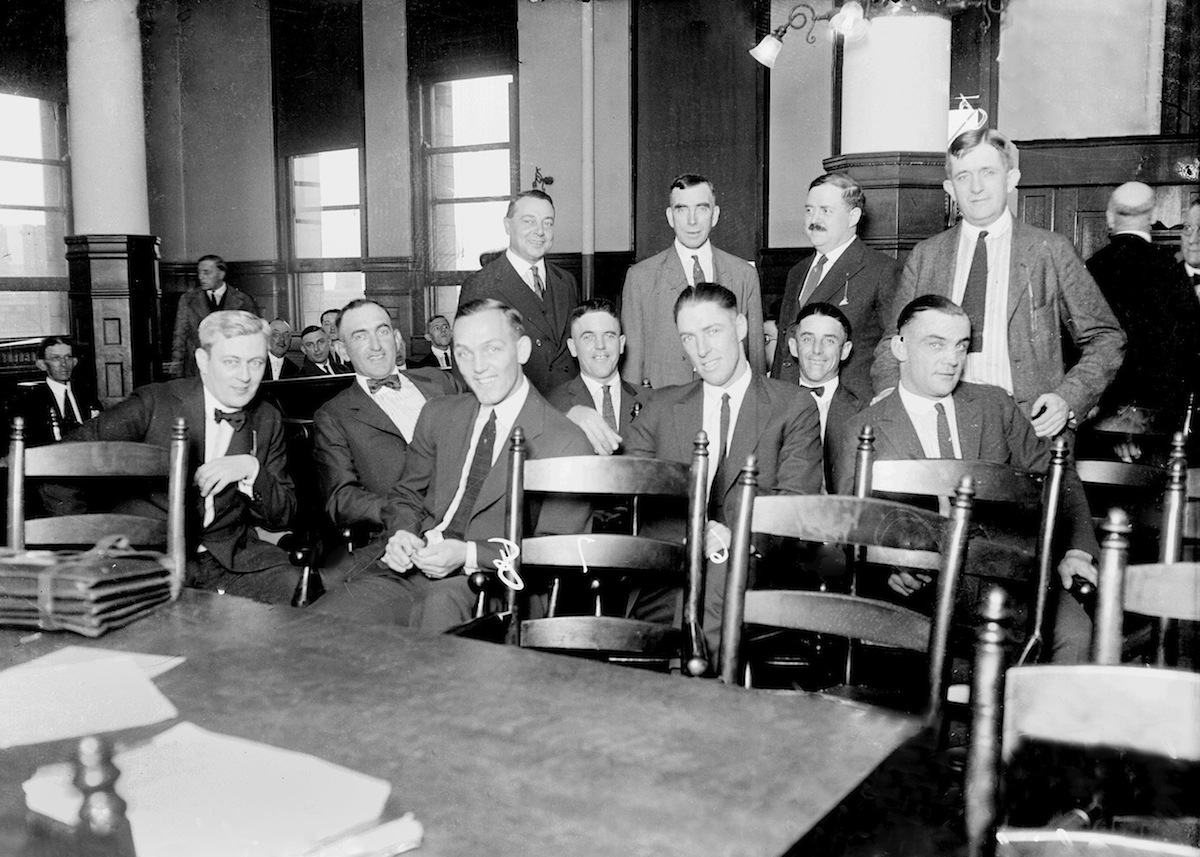
On Wednesday, the new Attorney General of the United States, Loretta Lynch, announced the arrest and indictment of 14 high officials of FIFA, the soccer world’s governing body, and of various regional soccer associations for massive, systemic corruption. Attorney General Lynch, who previously supervised the investigation as U.S. Attorney for the Southern District of New York, took advantage of broad provisions in U.S. laws allowing their application against acts largely, but not entirely, committed overseas. There is no precedent for this situation in international sport, but there is in American sport: the way in which Judge Kenesaw Mountain Landis, the first baseball commissioner, cleaned up the game and put it on a sound footing beginning in 1921, after the Black Sox scandal and the fixing of the 1919 World Series had come to light. FIFA and the strongest national associations now have to figure out how to solve somewhat different problems in an equally dramatic way.
Professional sport was in its youth in 1919, but baseball was already a huge presence in American life. Betting on it was, too, and it is clear that gamblers and players had been fixing games for at least a decade by the time an organized crime syndicate led by Arnold Rothstein of New York promised payments to the White Sox to throw the World Series against the Reds. The fix was about as secret as corruption in FIFA has been. An excellent ESPN documentary was just recently released that focused on allegations of huge payments by Russia and Qatar to secure rights to the 2018 and 2022 World Cups—charges that are part of a separate investigation by Swiss authorities—and on the role of FIFA President Sepp Blatter, the most powerful man in world sport, who has so far escaped indictment. Likewise, newspapers led by the New York Times reported the precipitous fall in the odds on the White Sox on the eve of the first game, and many people within baseball knew what was going on the series played out. When it was over, however, everyone wanted to get back to business as usual—as FIFA will—and the one courageous Chicago reporter, Hughie Fullerton, who kept the story alive, was harshly criticized for his zeal.
Thanks in part to feuds among the owners, however, the story began to leak out during 1920—when the White Sox were contending for the pennant—and finally broke in the last week of the 1920 season. Eight White Sox, including potential Hall of Famers Joe Jackson and pitcher Eddie Cicotte, were suspended at once. More importantly, the owners, under great pressure to restore confidence in the game, appointed federal judge Kenesaw Mountain Landis as commissioner, with broad powers to take any action he deemed in the best interests of baseball. Landis eventually banned not only the eight Black Sox, but 14 other players as well, for fixing games. For the rest of his tenure, every ballplayer knew that no contact with gamblers would be tolerated by the commissioner. Remarkably, Landis accomplished this even while civic morality in America’s major cities was collapsing under the impact of prohibition. He set a standard for probity that became an example for politicians like Fiorello LaGuardia, later mayor of New York, prosecutor and Governor Thomas Dewey, and President Franklin Roosevelt. Throughout his tenure, Landis settled virtually every case that came before him with public hearings that helped maintain confidence in him and in the game.
This week, Lynch has stepped forward to play that role on a world scale, taking steps that are very likely to lead to real reform within FIFA. Some national leaders and associations are bound to complain, but as a lifelong soccer fan myself, I have no doubt that the mass of fans all over the world will be totally on her side. They know that the next two World Cups were not awarded to Russia and Qatar because those countries were the best places to hold them, and they know that the FIFA leadership is not acting in the best interests of international soccer.
I suspect that Blatter will decline to accept the new term of office to which he was about to be elected, and FIFA will have a chance to clean house. To restore confidence and prove that things have changed, the organization’s new leadership must emulate Landis and take truly drastic action. For example, just as baseball owners agreed to give great power to a new authority, FIFA could change its power structure, reallocating votes based on population or upon the size and strength of nation’s professional leagues, rather than giving Monsterrat the same vote as Germany, as they do today. Just as Landis made a point of keeping the Commissioner’s office independent, FIFA must also design an utterly transparent and incorruptible process for choosing World Cup venues. Specifically, if evidence of bribery in the choice of the last two World Cups becomes clear, they must rescind the awards to Russia and Qatar, which were ill-advised—and, it now appears, ill-gotten—in the first place. But most of all, the new FIFA leadership, like Judge Landis, has to take this drastic action to prove that crime, in the form of bribery, does not pay, and to prove that things will indeed be different in the future. The real punishment for anyone who would buy a World Cup vote would be to see their investments vanish into thin air like so many credit-default swaps based on subprime mortgages—and without any chance of a bailout.
The indicted FIFA officials face potential jail terms, and meanwhile Lynch has established herself as a major figure not just on the national, but also on the world stage. She has struck a blow for civic virtue and honesty at the upper reaches of sport. The whole world needs leaders who can do the same for finance, industry and government. Perhaps Lynch herself has an even more important role to play in the future.

Historians explain how the past informs the present
David Kaiser, a historian, has taught at Harvard, Carnegie Mellon, Williams College, and the Naval War College. He is the author of seven books, including, most recently, No End Save Victory: How FDR Led the Nation into War. He lives in Watertown, Mass.
More Must-Reads From TIME
- The 100 Most Influential People of 2024
- Coco Gauff Is Playing for Herself Now
- Scenes From Pro-Palestinian Encampments Across U.S. Universities
- 6 Compliments That Land Every Time
- If You're Dating Right Now , You're Brave: Column
- The AI That Could Heal a Divided Internet
- Fallout Is a Brilliant Model for the Future of Video Game Adaptations
- Want Weekly Recs on What to Watch, Read, and More? Sign Up for Worth Your Time
Contact us at letters@time.com